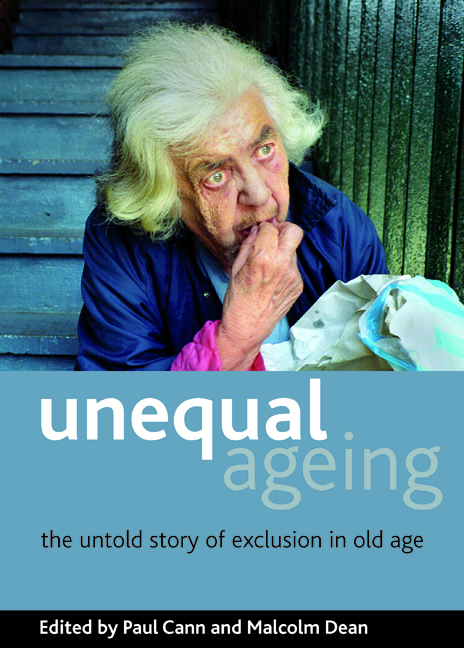Book contents
- Frontmatter
- Contents
- List of tables and figures
- Notes on contributors
- Acknowledgements
- one How social age trumped social class?
- two Too tight to mention: unequal income in older age
- three three The uneven dividend: health and well-being in later life
- four No place like home? Housing inequality in later life
- five What does it mean to be old?
- six A life worth living? Quality of life in older age
- seven Why is ageing so unequal?
- eight Rewriting the story
- Index
seven - Why is ageing so unequal?
Published online by Cambridge University Press: 16 July 2022
- Frontmatter
- Contents
- List of tables and figures
- Notes on contributors
- Acknowledgements
- one How social age trumped social class?
- two Too tight to mention: unequal income in older age
- three three The uneven dividend: health and well-being in later life
- four No place like home? Housing inequality in later life
- five What does it mean to be old?
- six A life worth living? Quality of life in older age
- seven Why is ageing so unequal?
- eight Rewriting the story
- Index
Summary
National characteristics
So far, this book has catalogued the extent of unequal ageing in Britain and its impact on older people. It falls to this chapter to try to explain the apparent paradox of the co-existence of great wealth and extreme poverty in old age in a society that is not only one of the most economically advanced in the world but one which also has a long, often radical, tradition favouring civil rights, citizenship and equality – a tradition which united British people both in wartime and in the post-war construction of society and the welfare state and which is witnessed continuously in, for example, the very high levels of support for the National Health Service (NHS). Of course this coexists, uneasily, with another British trait: our seemingly insatiable urge as a people to create status differentials.
What is ‘unacceptable’?
Some would argue, therefore, that inequality is inevitable in a late modern or post-modern society in which status has replaced class as the defining characteristic of identity; still others that, in the age of globalisation, it is impossible to do anything about it, even if we wanted to. I do not share these views. Thomas Scharf (in Chapter Two) used the label ‘critical gerontologists’ for those in the ageing field who accept neither the inevitability of poverty in old age nor the existence of unequal ageing. For us, there is a moral as well as a scientific imperative to tackle unacceptable inequalities among all age groups including older people. ‘What are “unacceptable inequalities”?’ the sceptics will enquire. The answer is simple: it is those inequalities that either transgress a distributional notion of social justice or damage the health and well-being of those at the bottom of the stratification hierarchy. The sceptics are persistent, and will press me on ‘distributional notion of social justice’ and ‘damage to health and well-being’. On the former, this idea of social justice means that everyone in the same society has the right, the human right, to enjoy at least the generally accepted basic living standard; on the latter, the scientific evidence is overwhelming that inequality inflicts harm not only on individuals but also on society as a whole.
- Type
- Chapter
- Information
- Unequal AgeingThe Untold Story of Exclusion in Old Age, pp. 141 - 158Publisher: Bristol University PressPrint publication year: 2009



